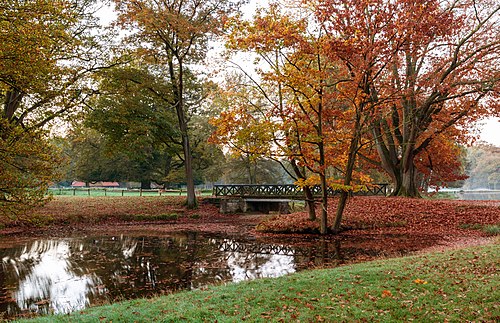Autumnnoun
Traditionally the third of the four seasons, when deciduous trees lose their leaves; typically regarded as being from September 24 to December 22 in parts of the Northern Hemisphere, and the months of March, April and May in the Southern Hemisphere.
Autumnnoun
The time period when someone or something is past its prime.
Autumnnoun
(fashion) A person with relatively dark hair and a warm skin tone, seen as best suited to certain colours in clothing.
Autumnadjective
Of or relating to autumn; autumnal
Autumnnoun
The third season of the year, or the season between summer and winter, often called "the fall." Astronomically, it begins in the northern temperate zone at the autumnal equinox, about September 23, and ends at the winter solstice, about December 23; but in popular language, autumn, in America, comprises September, October, and November.
Autumnnoun
The harvest or fruits of autumn.
Autumnnoun
The time of maturity or decline; latter portion; third stage.
Autumnnoun
the season when the leaves fall from the trees;
Autumnnoun
the season after summer and before winter, in the northern hemisphere from September to November and in the southern hemisphere from March to May
Autumnnoun
the period from the autumn equinox to the winter solstice.
Autumn
Autumn, also known as fall in North American English, is one of the four temperate seasons. Outside the tropics, autumn marks the transition from summer to winter, in September (Northern Hemisphere) or March (Southern Hemisphere), when the duration of daylight becomes noticeably shorter and the temperature cools considerably.
Summernoun
One of four seasons, traditionally the second, marked by the longest and typically hottest days of the year due to the inclination of the Earth and thermal lag. Typically regarded as being from June 21 to September 22 or 23 in parts of the USA, the months of June, July and August in the United Kingdom and the months of December, January and February in the Southern Hemisphere.
Summernoun
(obsolete) A pack-horse.
Summernoun
A horizontal beam supporting a building.
Summernoun
A person who sums. Compare adder.
Summerverb
(intransitive) To spend the summer, as in a particular place on holiday.
Summernoun
One who sums; one who casts up an account.
Summernoun
A large stone or beam placed horizontally on columns, piers, posts, or the like, serving for various uses. Specifically: (a) The lintel of a door or window. (b) The commencement of a cross vault. (c) A central floor timber, as a girder, or a piece reaching from a wall to a girder. Called also summertree.
Summernoun
The season of the year in which the sun shines most directly upon any region; the warmest period of the year.
Summerverb
To pass the summer; to spend the warm season; as, to summer in Switzerland.
Summerverb
To keep or carry through the summer; to feed during the summer; as, to summer stock.
Summernoun
the warmest season of the year; in the northern hemisphere it extends from the summer solstice to the autumnal equinox;
Summerverb
spend the summer;
Summernoun
the warmest season of the year, in the northern hemisphere from June to August and in the southern hemisphere from December to February
Summernoun
the period from the summer solstice to the autumnal equinox.
Summernoun
years, especially of a person's age
Summernoun
a horizontal bearing beam, especially one supporting joists or rafters.
Summerverb
spend the summer in a particular place
Summerverb
pasture (cattle) for the summer.
Summer
Summer is the hottest of the four temperate seasons, falling after spring and before autumn. At or around the summer solstice (about 3 days before Midsummer Day), the earliest sunrise and latest sunset occurs, the days are longest and the nights are shortest, with day length decreasing as the season progresses after the solstice.































